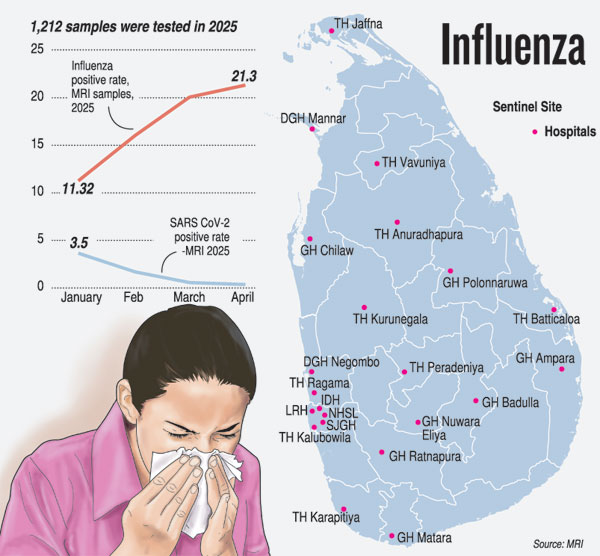News
All about the flu bug doing the rounds and simple precautions to ward it off
View(s):By Kumudini Hettiarachchi
Tiny infectious bugs have gone ‘viral’, compelling a large number of men, women and children to take to their beds at home or flood the hospitals.
Influenza (flu), dengue and chikungunya are some of these viruses doing the rounds in Sri Lanka. While influenza is spread through respiratory droplets when infected people cough, sneeze or talk, dengue and chikungunya get around through the bite of the Aedes mosquitoes.
It is about the respiratory illness that is the flu and how people need to take all precautions to prevent catching it that Consultant Medical Virologist Dr. Jude Jayamaha of the Department of Virology, Medical Research Institute (MRI) reiterated this week.
“Currently it is Influenza-type A that has taken the upper hand with a preponderance of H1, while H3 is also in circulation,” he says, requesting people to take precautions as there is a major religious festival next week. H1 and H3 are sub-types of the Influenza A virus.

He advises people to wash their hands frequently, not touch their faces as the transmission of the virus into the body is mainly through the nose, mouth and eyes, after touching contaminated surfaces. If in crowded closed spaces, may be wearing masks would help ward off the infection.
Pointing out that the flu is a self-limiting illness, Dr. Jayamaha says the common symptoms are fever, cough, cold, sore throat and difficulty in breathing. Anyone who catches the flu should rest, take plenty of fluids and see a doctor if there is no improvement in their condition after a day or two. Vulnerable groups such as the very young and the very old, expectant mothers, those who are immune-compromised and those with serious underlying medical conditions including cancer should be extra-careful. Non-Steroidal Anti-Inflammatory Drugs (NSAIDs) such as ibuprofen and aspirin should be avoided as they could cause liver damage.
With regard to complications of the flu, he says they could include pneumonia (inflammation of the lungs) and, in a few cases, encephalitis (inflammation of the brain).
The gold standard for the detection of Influenza is PCR (Polymerase Chain Reaction) testing of nasal secretions, while there is also a rapid test available now. PCR testing is conducted at the MRI; the Kandy and Karapitiya National Hospitals and the Anuradhapura Teaching Hospital.
According to Dr. Jayamaha influenza follows a bi-modal pattern in keeping with the monsoons – April-May-June and November-December-January-February, but sometimes with a slight variation.
Moving onto COVID-19, he says that in the past two years active surveillance by the MRI has shown that its prevalence has been less than 2% of viral infection detections.
With regard to surveillance for these viruses, the Sunday Times learns that there are 21 sentinel sites dotting the country now (see map), from which samples are collected and sent to the MRI’s National Influenza Centre (NIC) to keep track of the trends and also identify whether there are new respiratory virus threats to the country.
“We carry out year-round active surveillance with 10 samples being sent per month from each of these sites to the NIC which is also the National Respiratory Reference Laboratory,” says Dr. Jayamaha. The sites comprise the 21 hospital Outpatients Departments (OPDs) and five hospital inward sites.
Earlier, there were 19 sites, with two being added last year:
n January 2024 – the Negombo Hospital came onto the list, taking into account its proximity to the Bandaranaike International Airport, Katunayake, which could be a potential gateway for infection.
n December 2024 – the Mannar Hospital was added to the list as that area is very close to neighbour India with heavy traffic between our two countries and also because there is a large migratory bird pathway across that part of Sri Lanka.
Dr. Jayamaha explains that across the world and in Sri Lanka, experts are keeping a sharp eye out for avian influenza (bird flu) caused by H5 of the Influenza A virus, which primarily affects birds but can sometimes affect mammals including humans. This is because there are fears of the next pandemic being set off by bird flu.
The NIC, meanwhile, had been launched back in 1968 in Sri Lanka at the Kalubowila Hospital, finding a permanent home at the MRI in 1990. By 2008, the NIC had begun sentinel site surveillance with funding from the Centers for Disease Control (CDC), the national public health agency of the United States of America.
“Now, once-in-six-months, the NIC sends samples as well as positive cultures to the World Health Organization (WHO) Collaboration Centre in Melbourne, Australia,” says Dr. Jayamaha, adding that at the Vaccine Composition Meeting of 2008, one of Sri Lanka’s influenza strains (Influenza A sub-type H3) was selected to be part of the last four vaccine compositions.
The best way to say that you found the home of your dreams is by finding it on Hitad.lk. We have listings for apartments for sale or rent in Sri Lanka, no matter what locale you're looking for! Whether you live in Colombo, Galle, Kandy, Matara, Jaffna and more - we've got them all!

